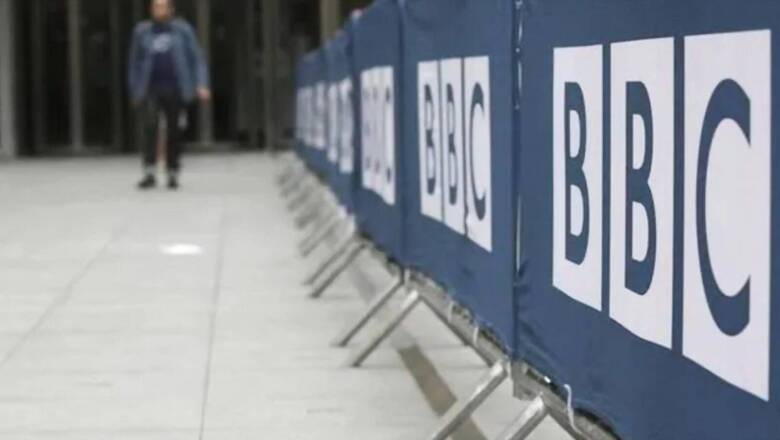
views
The Income-Tax Department on February 14, 2023, carried out surveys at the premises of British Broadcasting Corporation (BBC) India in Delhi and Mumbai, in view of the BBC’s deliberate non-compliance with the transfer pricing rules, international tax obligations and its vast diversion of profits. It is pertinent to note that the above exercise, conducted by the tax authorities, is called “survey”, not search/raid as per the provisions of the I-T Act. Such surveys are routinely conducted and are not to be confused with the nature of a search/raid. Also, under Sections 132 and 133A of the I-T Act of 1961, the Central government is completely within its right to conduct not only surveys but search and seizure operations too, if there is enough prima facie evidence of persistent violations of tax laws and tax evasion, which is exactly what the BBC in India has been found guilty of. Manipulation of prices for unauthorised benefits including tax advantages are serious crimes and the BBC India is found to be a repeat offender.
The I-T Act, 1961 was amended in April 2001 by substituting the existing Section 92 and inserting Sections 92A to 92F, to introduce Indian transfer pricing regulations (TPR), in line with Article 9 of the Organization for Economic Co-operation and Development (OECD) guidelines on transfer pricing. The amendment also defines international transactions, documentation requirements, and associated enterprises in a broad-based and expansive manner. These regulations, which came into effect in 2002, mainly covered intra-group cross-border transactions. From April 2013, the provisions were extended to specified domestic transactions between related enterprises. Thus, the transfer pricing regime in India applies to both domestic and international transactions, which fall above a threshold in terms of deal value. It is regulated on the basis of Section(s) 92A-F, I-T Act, 1961 and relevant Rule(s) 10A-E of the Income Tax Rules, 1962. I-T investigation into BBC India’s tax violations, therefore, pertains to these TPR violations.
Several notices have been issued to the BBC from time to time by different I-T authorities including Transfer Pricing Officer and the Income Tax Appellate Tribunal. However, BBC India has been continuously defiant and non-compliant, which is unacceptable. Those alleging this is a vendetta by the Modi government are ignorant and need to know that the BBC is not holier than thou. In fact, in its home country, the United Kingdom (UK), the BBC is accused of multi-million-dollar tax evasion.
In India, the BBC has reportedly been deliberately diverting a significant amount of the profits and has not followed the “arm’s length” arrangement. Arm’s length means that the price a company pays to purchase goods or services from a related company should be the same as if the two entities were unrelated. In other words, there should be no price adjustment or special conditions for the transaction simply because the parties are related legal entities. “Arm’s length” is an expression which is commonly used to refer to transactions in which two or more unrelated and unaffiliated parties agree to do business, acting independently and in their self-interest.
BBC India or National Herald or any other institution is not above the law of land. But, the moot issue is: Why is the Congress party always seen standing with anti-India elements? By supporting BBC, the Congress is trying to create hindrances in the work of a regulatory body without any reason/cause. Why does the party not trust our tax officials and our tax department? Why does the party repose faith in a foreign entity that has a horrifying track record? BBC’s incompetence and lack of ethical reporting has been discussed in detail in subsequent paragraphs here.
Agencies are performing their duty under the powers given within the purview of the Indian Constitution. The Congress does not have faith in any constitutional body. Neither does it believe in the Constitution of India, nor the orders of the court, the government, or any regulatory body. Hence, Congress leaders jumping to the rescue of the BBC is hardly surprising. The party must introspect its own history though, before supporting the BBC. On June 10, 1970, the British broadcaster aired a film depicting the Congress party in a negative light. This was followed by another anti-Congress film which was broadcast on June 23, 1970. In response, on July 1, 1970, the Indian Embassy in Britain sent a letter to the BBC and the British Foreign Office, urging them not to show such films. On July 29, 1970, the Indian government, led by Prime Minister Indira Gandhi, ordered the BBC to be expelled from the country. BBC’s office in Delhi was shut down and its staff was deported along with their belongings.
On August 14, 1975, a joint statement was released by the members of the Congress in which they accused the BBC of continuously defaming India and misrepresenting its image. “BBC does anti-India reports. That’s why the government should never allow the BBC to set foot on Indian soil.” This statement was from the party’s MPs then, but today, when BBC India is being probed for tax fraud, the Congress, driven purely by a visceral hatred for PM Narendra Modi, has no qualms in standing up in favour of the British broadcaster.
Its poor track record is not new. In March 2015, the Delhi High Court upheld the decision to ban a BBC documentary. In this documentary, Mukesh Singh, convicted of the Nirbhaya gang rape in Delhi, was eulogized by the BBC. In 1995, an interview with Princess Diana was shown on the BBC. This interview was one of the most-watched programs worldwide and was taken by Martin Bashir. But many years later, it came to light that the entire interview was based on a fake document.
The Congress party lamenting over the lack of freedom for the press under the Modi government is so paradoxical. Since the times of Jawaharlal Nehru, the Congress party has been highly intolerant and has left no room for dissent, acting strictly against the press whenever they have raised fingers against the misdeeds of the Congress.
All this began when India’s first Prime Minister, Jawaharlal Nehru, decided to move the first amendment to the Indian Constitution in 1951, which, as per clause 2 of article 19, imposed “reasonable restrictions” on free speech. This lack of freedom of expression was also visible when poet and lyricist Majrooh Sultanpuri was arrested and spent a year in jail for writing a poem critical of Nehru.
Jawaharlal Nehru allegedly got a Times of India column written by civil servant AD Gorwala — who wrote under the name ‘Vivek’ — discontinued as it was too critical of him. The Congress government under Nehru banned the magazine Cross Roads. Later, the Supreme Court overturned the ban imposed on the magazine but Nehru bypassed the SC judgment through the First Amendment act.
The Indira Gandhi government, after imposing Emergency in 1975, imposed censorship of the press during that period. In 1980, the Congress government arrested editors Ajay Mitra and Guru Sharan Singh of Singhbhum Ekta and Samata respectively.
During the pre-Emergency period, the editors were made to face the wrath of the Indira Gandhi government. In West Bengal, the Congress loyalists had burnt 3,000 copies of Darpan, Bangladesh and Satya Yugi as they were critical of the Congress government. In 1972, the editors of Renaissance, Jantar Mukh and Frontier were told to stop publication by the Congress loyalists or face physical liquidation. Hindustan Times editor BG Varghese was sacked by the publication after he wrote critically against Sanjay Gandhi. In 1982, under the Congress government, the Bihar Press Bill of 1982 was introduced by the then Chief Minister Jagannath Mishra. The bill had given the state government the authority to restrict the publishing of ‘grossly indecent’, ‘scurrilous matter’ or one that was ‘intended for blackmail’. Journalists violating the bill could land in jail for two years for the first offence.
In 1975, just before Indira Gandhi had imposed Emergency, the then West Bengal Chief Minister Siddartha Shankar Ray was advised by Congress leader Om Mehta to cut the electricity supply of newspaper offices so that the critical news of the Emergency being posed did not reach the masses. The Congress government led by Indira Gandhi reduced advertising in newspapers that were critical of its policies. To control the flow of information, the government had announced the merger of the Press Trust of India (PTI) and the United News of India (UNI). Moreover, it had also merged Samachar Bharti and Hindusthan Samachar which published news in Hindi.
The erstwhile Congress government used intimidatory measures such as eviction from government houses and shutting down media houses, against journalists and publishers. The Indira Gandhi-led government also implemented the Monopoly and Restrictive Trade Practices (MRTP) Act that limited the reach of media to the audience due to lesser prints. Such regulations against freedom of expression by the Congress have also been seen in this millennium. In 2012, the Congress-led UPA government blocked access to Charlie Hebdo’s cartoons and to an anti-Islam film. Ex-Congressman, Kapil Sibal, the man behind the draconian 66-A of the I-T Act, was also seen openly calling for a ban on “hateful content” generated on websites. Read “hateful” as Hinduphobic.
In 2018, the Congress-JDS government in Karnataka arrested Santhosh Thammayya, a journalist with the newspaper Hosa Digantha on November 13, 2018, around midnight for making an anti-Tipu speech.
The Karnataka police arrested Santosh after he spoke critically against Tipu Sultan. In 2010, the BBC published a series of reports implying that millions of pounds in charity money raised by Live Aid to fight famine in Ethiopia were spent on weapons. Following these reports, Bob Godolf, the founder of Live Aid and Band Aid Trust, complained to the Office of Communication of the United Kingdom. The BBC initially announced that it was standing by its report and claimed to have evidence to back up its stance. Then, in November 2010, it conceded that it had no evidence to back its claims and agreed to run a series of unreserved apologies. Hence, the BBC’s documentary on PM Modi is nothing but a defamatory one, based on surmises and conjectures of discredited individuals like Jack Straw, Aakar Patel and the like.
On June 18, 2011, the British broadcaster published a story about a Jerusalem court ordering a dog to be stoned to death. The story said that the dog walked into the court and supposedly “reminded a judge of a curse passed on a now deceased secular lawyer about 20 years ago when judges bid his spirit to enter the body of a dog.” Later, the dog was stoned to death as per the court’s orders. This story turned out to be a hoax. The Jerusalem court summarily denied the story that was reported. On June 22, the BBC took down the story and issued an apology in the form of a blog.
In 2010, the British broadcaster ran a documentary on a particular housing estate in Lawrence Weston, Bristol, for the BBC1 show ‘The Estate We Are In’, where they showed how the estate was troubled with anti-social elements. However, after the documentary was aired, several residents of the housing estate flooded the BBC with complaints. This row hit the BBC’s popular television series ‘Frozen Earth’. When viewers thought that one of their scenes that showed the birth of polar bears was shot in the Arctic, they got a rude shock when it was revealed that it was actually shot in a man-made den in Germany.
BBC, in 2016, had published a report that claimed a boy was being questioned by the police in connection with terrorism because of a spelling error. It reported that a boy, who attends a Lancashire primary school, was interviewed by the police after he had written that he lived in a “terrorist house.” His family claimed this was a spelling mistake and he meant to say he lived in a “terraced house.” Such is the horrific reputation of the BBC! And it has the audacity to cast aspersions on PM Modi, who was exonerated and given a clean chit by India’s Supreme Court in June 2022. Who gives the BBC the right to undermine India’s judicial process?
In 2016, it came under fire for faking dramatic scenes in two of its nature shows. According to governing body The BBC Trust’s report, staff working in the broadcaster’s flagship Natural History Unit were banned from working on future shows until they complete a new anti-fakery course.
A shocking incident came to light in 2013, where the British broadcaster was said to have put the lives of students in danger, that too in a dictatorial state like North Korea. Several students claimed being told by the BBC that they were travelling with a History professor to North Korea, who actually turned out to be an undercover journalist, thereby endangering their lives. In 2011, ‘Mark & Olly: Living with the Machigenga’ was shown on the Travel Channel in the US and the BBC in 2010. In the show, Mark Anstice and Olly Steeds lived in a Matsigenka Indian village for several months to show the ‘reality’ of life among the tribe. This show was slammed by veteran anthropologists as fake and fabricated.
The false rape and/or domestic violence allegation report was conducted by the UK’s Crown Prosecution Service over 17 months. The report had then concluded that the cases of false rape are ‘very rare’. However, women and rape victim support groups say a BBC Newsbeat story exaggerates the occurrence of false rape allegations and flies in the face of the CPS’ report. The BBC published a report saying that a protest march against the bombing in Syria had gone violent and attacked MP Stella Creasy’s house. This report later turned out to be fake and the BBC issued a retraction.
This pertains to Israel’s Operation Pillar of Cloud back in 2012. As part of its operations, Israeli armed forces launched strikes against Hamas-backed propaganda outlets which spew virulent anti-Jew hatred. The BBC was party to spinning this as an attack against the media. It was also revealed that certain media outlets were sharing premises with the Hamas-backed propaganda outlets. And especially after Israel had warned a few days earlier of targeting Hamas infrastructure, sharing offices with their outlets wasn’t very smart. In January 2017, the BBC Trust observed that coverage of its own network breached accuracy with its reportage of Corbyn’s interview. The BBC’s political editor, Kuenssberg, said, “Earlier today, I asked the Labour leader Jeremy Corbyn if he were the resident here at Number 10 and whether or not he would be happy for British officers to pull the trigger in the event of a Paris-style attack.” Corbyn’s apparent response to the question was, “I’m not happy with a shoot-to-kill policy in general. I think that is quite dangerous and I think can often be counter-productive.”
During the Trump regime, BBC tweeted that POTUS told the UN General Assembly “war will follow” his decision to reimpose sanctions on Iran, when President Trump had actually said, “more will follow.” The BBC was forced to admit its mistake after it was bombarded by people accusing the organization of spreading fake news. The BBC claimed that the reporter had misheard the President and it tweeted a clarification with the hashtag #OurBad.
In October 2014, the BBC was accused of incitement, hatred, revisionism and genocide denial over its documentary about the Rwandan genocide that led to the slaughter of at least 800,000 ethnic Tutsis and moderate Hutus. The Rwandan government had suspended BBC broadcasts in the Kinyarwanda language because of the content of the documentary. Scholars across the globe had registered a strong protest against the narrative the BBC peddled in the documentary and demanded that an apology be issued for distorting the reality of the genocide. In May 2015, the BBC shared a fake story about a hotel in Nigeria serving human flesh. In reality, human skulls were discovered at the place and there was no evidence whatsoever to back the claims that human flesh was being served although it does appear human skulls were indeed discovered by the police.
The British broadcaster faced severe backlash over its documentary where it was accused of having sensationalized racism in Poland and Ukraine, the hosts of the football tournament.
In an outlandish June 2015 report, the BBC quoted a Pakistani source to claim that India was funding the Muttahida Qaumi Movement (MQM) in Pakistan. The report was heavily criticized by all sections for relying solely on the words of an unnamed Pakistani source to reach dubious conclusions. During an interview with Christian Broadcasting Network in January 2017, POTUS Trump, referring to the Obama administration, told the interviewer, “They [Syrian Christians] have been horribly treated. Do you know if you were a Christian in Syria it was impossible, at least very, very tough to get into the United States? If you were a Muslim, you could come in, but if you were a Christian, it was almost impossible.” In 2004, the BBC admitted that their editing of an interview conducted by Jeremy Paxman was misleading and showed the guest in a bad light.
Clearly, the BBC has had a despicably shoddy track record and has retracted many stories in the last many decades, as these stories were found to be completely false. BBC’s racist and imperialist attitude in its coverage of India continues even to this day.
Coming back to the tax violations by BBC India, the provision of search is very harsh and is often termed as draconian by critics. Therefore, the legislature has provided enough safeguards so that the same is not used by the authorities in a mechanical and arbitrary manner. For instance, it has been provided that search action can be undertaken only when authorising officer forms “reason to believe” in consequence of relevant and cogent information in his possession that the person is having in his possession evidence relating to undisclosed income or undisclosed assets or about the non-compliance of summon or the notice u/s 142(1).
Search action and surveys are generally initiated when the authorising officer is satisfied that incriminating evidence is there, relating to undisclosed income or undisclosed assets. In case no seizure is expected, there is generally no need for search and the affairs of an entity can be investigated by way of open enquiry or by other methods.
For BBC India’s Mumbai and Delhi offices to be surveyed by India’s I-T officials, clearly, enough incriminating evidence has already got to be there in possession of tax officials. The other objective of initiating a search, sometimes, is may be to get hold of the books of account or documents which have a bearing on the tax liability of an entity that seeks to withhold, by way of repeated non-compliance of notices or summons issued by the authorities, which is exactly what BBC India has repeatedly done.
Suffice to say, the law of the land in India is supreme, equal for all and does not discriminate. That said, BBC India has to comply with India’s tax laws and judicial process. Crying wolf will not work. Period!
Sanju Verma is an economist, national spokesperson of the BJP and the bestselling author of ‘The Modi Gambit’. Views expressed are personal.
Read all the Latest Opinions here













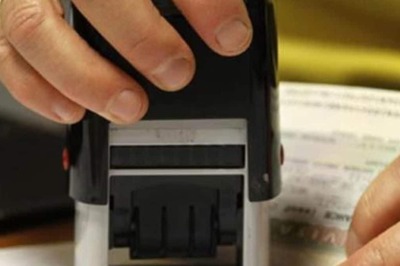
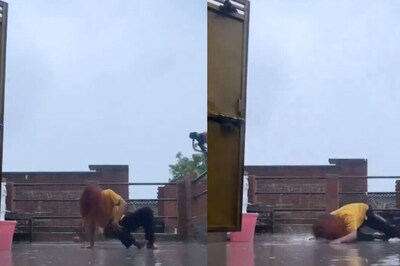
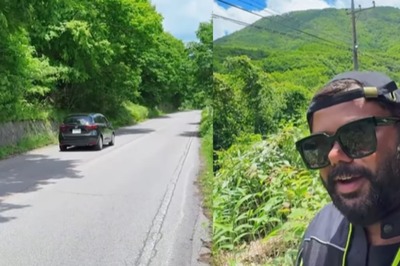
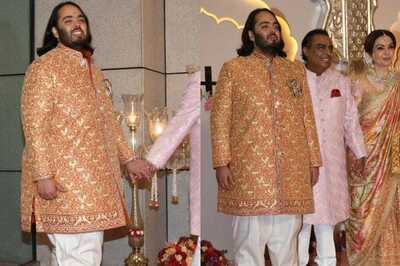

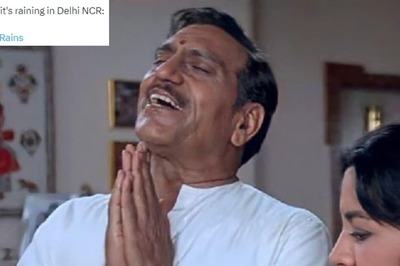

Comments
0 comment